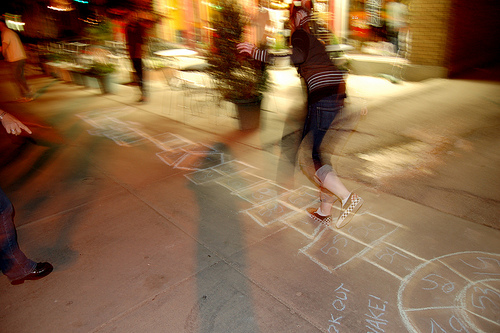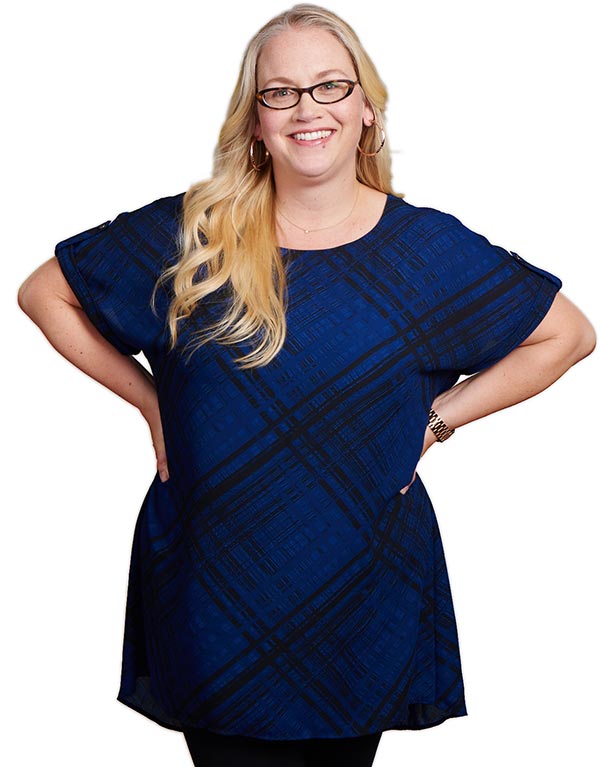
Some people hop-scotch from one disordered eating behavior to another on their way to finding freedom. Have you ever done that? (photo via flickr/MC Quinn)
When I was writing my book, experts told me that it’s incredibly common for people to use several different disordered eating behaviors over their lives. You might start out with extreme dieting or purging, but then fall into bingeing, then boomerang back to restricting again. That’s why I asked Angie to share her story. At different times in her life she has fallen on all different spots on the disordered-eating spectrum—and I thought many of you might relate. xo…Sunny
Hi, my name is Angie and I’m recovering from multiple eating disorders. I hope my story does not trigger anyone, but some readers might find the content triggering. Please consider your health and wellbeing before reading. My eating disorder journey started with compulsive overeating when I was 10 years old. We lived in military housing on a remote area of the base. There were only eight houses on the street which was the entire neighborhood. I felt very isolated from peers. With few friends, and busy parents, I had a lot of time on my hands. I filled that time by eating. When I was not in school, I ate and watched TV. I ate not because I was hungry, but because I was lonely and scared.
My parent’s marriage was ending and I wanted to feel safe, secure, and full. Food helped to fill some part of me, at least temporarily, so I ate. After several weeks of this type of eating my Mom noticed weight gain and started to monitor my food consumption. I started to sneak eat, and, when she caught me, she made it clear that if I wanted to be liked and accepted, I needed to be thin. More than anything I wanted to be liked and accepted so I literally stopped eating to drop the weight. It worked. I seemed to find more approval from my parents and peers so I began an obsession with anorexia. Sustaining a life without food is difficult so my entire existence became focused on how to not eat, but appear to be eating. I checked out of life by obsessing about food to avoid reality.
My body dysmorphia could not have been worse and I began to have negative self-talk 24×7. As I struggled with physical hunger, I lost all perspective about food. When I did eat, I engaged in bulimic behaviors to purge the food that I had consumed. I do not want to detail my bulimic practices, but, to this day, those days of living with anorexia and bulimia were the most destructive and devastating days I have known.
By some miracle, a family member forced my parents to recognize my life was at risk and I was hospitalized. By the time I was hospitalized I had hit bottom and was completely ready for recovery. I began a long program of cognitive behavioral therapy (CBT). While the hospitalization was only five weeks, my outpatient therapy continued for years. I learned so much about myself and what life could offer. With the official diagnosis of my eating disorders and depression, I realized that I was sick with diseases that affected other people: I was not alone. Realizing other people had recovered from these diseases was a relief so I embraced the CBT and used these tools for a long, sustained period of recovery.
After 15 years of recovery I had some major life changes occur and I relapsed. Not a little relapse; it was a devastating relapse that snuck up on me. At the time I started to relapse my life was so busy that I didn’t think about how my change in eating behaviors might signal the onset of another eating disorder. Things started slowly. I would binge when alone. I rationalized the binges by congratulating myself for not restricting or purging. The binges left me feeling terrible and I could not stop bingeing. I did not want anyone to realize I had a problem so I became preoccupied with trying to maintain my weight and size while bingeing. I felt terrible inside and out. What was wrong with me? I was trying so hard not to be anorexic and bulimic that I didn’t realize my behavior fell into a newly identified category of eating disorders: Binge Eating Disorder (BED).
Given my life with a husband, two young children, and full-job was so hectic, I felt like the only way I could find help was to reach out online. After months of searching online, I found healthygirl.org. When I read Sunny’s story, I cried. I felt so much relief to know that I, again, was not alone. I read more about BED and realized that I had fallen into relapse. As I struggled to recover from BED, I put a lot of rules on my food consumption and became obsessed with healthy, ‘clean’ eating. Months later I realized that this behavior was in-line with yet another eating disorder: Orthorexia.
Stunned that all of my coping mechanisms were leading me to eating disorders, I finally asked for help and restarted cognitive behavioral therapy. I had stopped CBT when I was around 20 years old due to a change in health insurance, but, at 35, realized it was the only way I was going to find help. I have found recovery (again). Today I am grateful for my recovery and careful with my life. I realize that even after years of recovery, little things can happen and I can be triggered into restarting an eating disorder. Yes, there are a lot of issues that I have skimmed over, but I hope this part of my story helps anyone struggling with multiple eating disorders realize that you are not alone and recovery is possible. Thanks for reading. —Angie
Have you ever bounced from one strange eating behavior to another? Perhaps extreme dieting to bingeing and back again? Where are you now in your journey? xo…Sunny



![How Therapy Has Worked For Me [guest post]](../../../../wp-content/uploads/2011/02/therapy_thumb.jpg)

![Have You Dared to Tell People About Your Eating Issues? [guest post]](../../../../wp-content/uploads/2011/05/3674715600_57a4e914e43-253x300.jpg)
![How to Deal With Big, Bad Food Guilt [guest post]](../../../../wp-content/uploads/2011/04/2551148803_0f4b7486be-300x242.jpg)


Sunny, thanks for this post! I’m a 24-year-old woman living who’s lived with an eating disorder for 10 years, and I too have experienced a huge spectrum of disordered behaviors. At 14, I developed anorexia nervosa subtype I (restrictive); when my parents put me into recovery against my wishes, it evolved into anorexia nervosa subtype II (I would eat my meals as required, but engage in compulsive exercise to compensate, which was considered a “purging” behavior). By the time I was 17, I begin inducing vomiting; this soon evolved from another version of AN-II into bulimia as I begin bingeing. When I entered conservatory the next year, I returned to AN-I and took my compulsive exercise to the next level, typically exercising 5 hours per day. I also developed orthorexia, limiting my intake to extremely “healthy” foods.
Since then, I’ve bounced back and forth between anorexia and bulimia. I’ve gone for up to 10 days without eating; I’ve also consumed close to 10,000 calories in a single binge-purge session. I abuse ipecac, laxatives, and ECA, and I self-injure as an extension of the ED. I suffer from osteopenia, amenorrhea, hypokalemia, and arrhythmias. When I try to keep myself from bingeing and purging, I’ll revert to fasting or extreme restriction; when I try to increase my intake, I’ll purge and then cycle back into bingeing and purging. I’m currently in a walking cast from stress fractures in my feet, but I’m still logging at least 10k per day.
Dealing with multiple manifestations of an eating disorder is complex and challenging. Thanks for bringing awareness to this issue! I would be glad to share the full version of my story, if you have an interest in following up on this entry at a later date.
Take care!
Hi Scarlett,
I’m hoping that you are in treatment now, or if not, that you’re planning on seeking it again. No one should have to suffer and be an ill as you have been. xo…Sunny
At the age of 10, I didn’t like the number on the scale. I was tired. I was unhappy with my body. I felt physically weak. I felt empty, and food made me feel full.
I didn’t like myself. I believed I had to be thin to be “pretty.” In effort to become “ideal,” I turned to the pre-teen ways of trying to lose weight. I skipped breakfast; I would “workout.” Furthermore, I rebuked myself; I criticized my body; I abhorred my “large” body. Not only did this not work, but the number on the scale kept rising. Unfortunately, at the age of 1o, I didn’t know that, because growing and developing, I was supposed to gain weight.
When my mom was diagnosed with diabetes, we began to turn our lives around. As we began to make changes–more home cooked meals, homemade bread, exercising–slowly, but surely, I began to like myself again.
Nonetheless, over the years, the cycle kind of started again; I became – restrictive. The restriction didn’t develop all at once–kind of here a little, there a little. I became overly concerned about
•the number on the scale (again)
•the number of fat grams
•having to have a certain thing at every meal whether I wanted it or not
•eating even if I wasn’t hungry, because the clock said it was time to
•not eating even if I was truly hungry, because it wasn’t time to
•only eating a certain amount at a time – because even if I wasn’t satisfied, if I ate more, I would be “unhealthy.”
I didn’t view it as a diet. I was just being “healthy.” Nevertheless, I wasn’t listening to my body. I wasn’t in-tune with my body. I practically ignored it. I was under this mindset for longer than what I want to remember. I had Orthorexia.
It took time, but I finally came to the resolve that this was a problem – a problem I needed to overcome. I was only hurting myself – my body – my sacred and divine temple. I needed to develop a healthy relationship with food. I thought I was being “healthy” before, but in fact, I was just being restrictive. I needed a balance.
I now strive to listen to my body — to be in tune — to live in balance. It has been a difficult journey, but you know, it’s something I work on daily. I can never give up. I will never give up. I continually strive to love myself for who I am. Although Eating Disorders are not fun, it is possible to heal. There is hope.
Angie, thank you for sharing your story. It has changed me for the better.
Wow - Thank you so much! I have been very nervous about sharing, but decided that it was worth it. I’m glad you found my story helpful.
hi there, awesome site, and a really good understand! one for my bookmarking.
I’m glad this article helps. I worried about triggering, but, for me, when I learned that people can experience more than one eating disorder, I looked more closely at myself and realized I needed help. I hope my sharing brings people closer to recovery!
I think it’s really interesting that a number of us have experienced this movement from one type of ED to another. It seems fairly common. I had heard previously that it is quite common for people who have had anorexia to become bulimic over time, as the anorexia becomes difficult to sustain, but have heard less about movements to other EDs.
Whilst interesting, I think perhaps the most important point to note here is not that we may experience different EDs. It’s more that for us to be engaging in ANY disordered eating behaviours, something ELSE is going on inside. How it manifests itself is almost by-the-by, without wanting to make light of it.
For us to keep eating in this manner seems to me to be because the stuff that happened to lead us to this coping mechanism in the first time is still unsolved. Or perhaps we come up against new challenges we don’t know how to deal with, and go back to what we know.
I think that we struggle to see this sometimes if we see ourselves as ‘recovered’ or not. I don’t think it works like that. We move on, find new ways of coping and living that we hope are healthier, and the ED is not needed anymore. Maybe we might come up against situations where all we can think of is returning to the ED. Sometimes we will, and sometimes we won’t. I think accepting that there is a possibility that we might be tempted to return to ED behaviours helps us to keep up the hard work we do in moving forward, like this person has with CBT. It’s a life-long task to keep up, rather than something we do and then are ‘recovered’.
I am now at a point in my life where I don’t think I would fit into any category of ED. I am learning to accept that perhaps I don’t have an ED anymore. I know I may always be a little vulnerable to resorting to ED behaviours (whether these are anorexic or binge eating), and I am trying to figure out how to manage this new stage of moving forward.
I have a lot of work to do to re-learn how to eat, how to cook and generally how to feed myself. It can feel a bit humiliating and embarrassing to admit - even to myself - that I don’t know how to do this. It’s not that I don’t have the information or know how to find it - it’s the doing it I struggle with. And also accepting that this is an issue for many ‘normal’ people too, as we all lead busy lives.
It’s quite common for people to focus on one disordered behavior, then swing to another. Too often the DSM is held up as the way people with a “real” ed behave, in that they only do anorexic behaviors or bulimic behaviors or EDNOS behaviors. I ran the gamut from binging to restricting to diet pills to diets to overeating. I had a more “anorexic” period at one point, then a more “non-purging bulimic” period, what could be considered EDNOS, and what could be considered BED. Don’t let labels make you feel you aren’t really sick or aren’t sick enough.
Angie thank you so much for this post! I have been recovered for 4 years now and I realize that I always need to protect my recovery. For me this means no dieting, restricting or elaborate food preparation. I am so grateful for my recovery each day and hope that I can stay in touch with that gratitude and do my best to help others.
Congratulations on making your way back! That’s remarkable!!
This post meant so much to me. I have been dealing with eating disorders for only a year but have already been in and out of the hospital, fallen into comas, lost 35 lbs in 1 month, gained 20 and so on…..it’s been quite the experience, and everyday I wake up and my day is either devoted to being anorexic, bulimic, or a binge eater. I was a…”devoted” anorexic for about 6 months, and in that time I found tons of pro-ana sites, when I instead come across sites like this my heart is lifted and I feel like there’s some hope that these diseases can be conquered.
I miss being who I used to be- top athlete, popular, heck, even pretty… My hair is still straggly from starvation, my weight is higher then it’s ever been, and I can’t remember the last time Aunt Flow came knocking…but I know I’ll get better, and reading this story really helped me along!
I am 72 years old and just realized that I have had an ED all of my life. It started when I was 12 and went on a diet and lost 20 lbs. I married at 18 and always felt my husband did not love me. I started binge eating when I was alone. I have done it occasionaly thru the years. After some years of lots of stress I started BE in the last 4 years and it is getting worse. I really feel sick and miserable afterwards and for a couple of days. It finally dawned on me that I have an ED and don’t know what to do about it. I have been a yoyo dieter all of my life. I really don’t know how to eat normal. Is there any hope for me??
YES, there is hope for you, Carol! I have so much to say here that I made it a blog post. Please give it a read! xo…Sunny
[…] read a new comment this morning that really left me awash in emotion. It was from 72-year-old Carol, and it made me […]
[…] I’m happy to say HealthyGirl.org reader Angie is back with a guest post. Her first time here, she wrote about hopping back and forth between different disordered behaviors that resonated with a lot of readers. This one, about food guilt, no doubt will too. […]
All I can say is that reading this article made me feel not alone.
To put my story in short. My eating disorder started for me at the age of 12 with anorexia nervosa.
I have always been a healthy (not overweight) girl through my k-6 grade school years.
After hitting age 12..my weight plummeted down to an underweight category for my height. I was obsessed with exercising and allowing myself to only eat VEGAN foods.
My first hospitilization took place in 2003. I met other girls with eating disorders, and I realized that I was never THIN enough to get help.
From the day of my first discharge for the treatment of my anorexia, I would get worse and add more “diet” rules to my life. CALORIES BECAME A HUGE THING FOR ME. I would be in and out of hospitals countless times, and my weight would be always lower than my last admission. It’s as if I was telling myself while in treatment that ” I can go back to my old ways once I get out, but more thinner.”
One day..after turning 18 years old and having the ADULT label, (No more parents forcing me into hospitals, hooray)
I realized that I could just continue to not eat and no one was going to force me to do anything..
I was delighted with the idea..but for some reason.. in 2009 my anorexia shifted to BED.. after 6 years of compulsively worrying about gaining weight after taking a bite of something, or not being able to eat anything without measuring it or knowing the exact amount of calories, or having to exercise for a certain amount or I cannot end my day and just go to sleep even though there is a test tomorrow at school, or even after all the in and out of hospitals because I could not stand to keep my weight of at least the minimum for what is required for my body to be healthy..
My anorexia shifted to BED. Totally different disorders. I am ashamed, afraid, and angry at myself for doing this to myself. I feel like I have become a whole different person (except in a negative way, and still carrying the beliefs of ” I HAVE TO BE THIN TO BE WORTHWHILE” stuck in my mind from anorexia.
Everyday, I struggle with overeating or not eating enough/fasting.
I have constant thoughts when I look in the mirror about how I used to be thin and now I am literally fat and not the anorexic mind feeling/telling me that I am fat…
I guess I should say that after the huge weight gain I have come to the realization that I was indeed THIN back then when I would complain to my doctors and family about how I was fat and didn’t want to gain weight… Sounds like bullshit now. After knowing what it really means to be fat by medical standards, I can acknowledge the fact that I was underweight before…
I am currently 20 years old. I go back and forth with restricting/fasting.. OR BINGING..
Binging tends to be stronger which keeps me at the high end of my weight range..
I could gain and loose at least 10lbs within a week (sometimes even more) It’s hard to accept my body when it constantly changes.
I tend to become a hermit when I binge..I would not want people to see me FAT..I cannot see old friends from highschool because during those years, people know me for the anorexic girl..I am no where near thin, so I do not want people to see me as the FAT girl now.
I have not yet gone to college because my BED started around end of my senior year in high school. And to also add on to this, I did not go to graduation ceremony because I was gaining weight and I didn’t want people seeing my weight gain.
I have never dated a guy before because my eating disorder started at 12 and I have been too consumed in my thoughts that I didn’t want to bother with relationships.
And now that I am fat, I don’t have confidence that a guy would like me. I am pretty boring, so that kind of ruins my chances..
Anyways, I say I was going to put my life to short but I guess it ended up being long.
I apologize.
I just wanted to get that out and I am glad I was able to come across this article..
THANKS